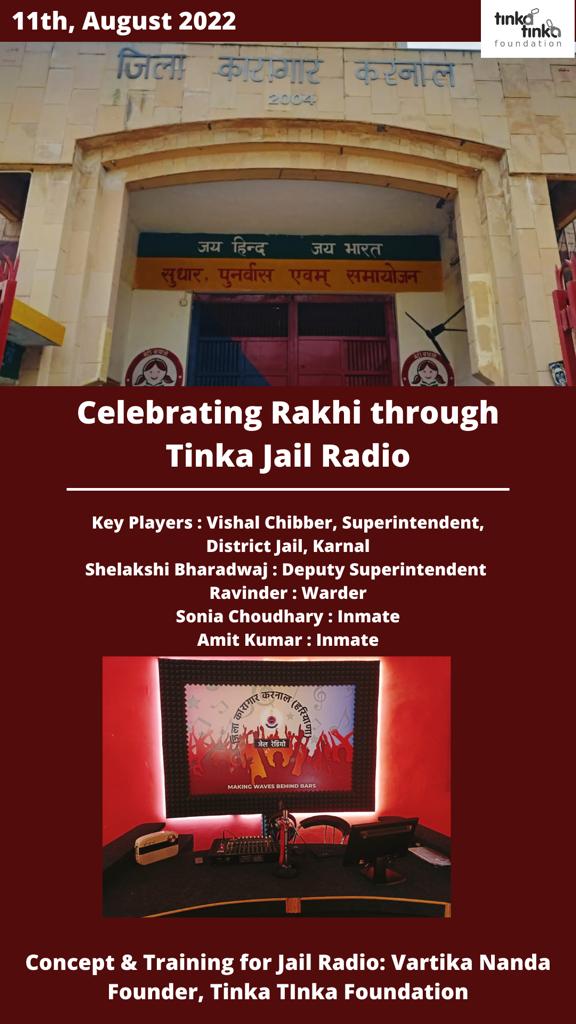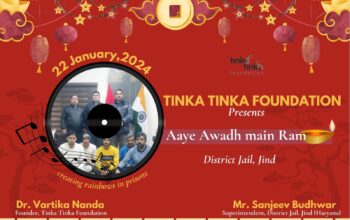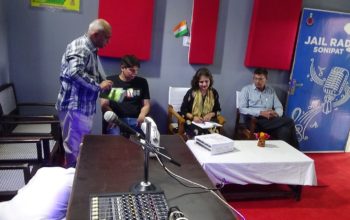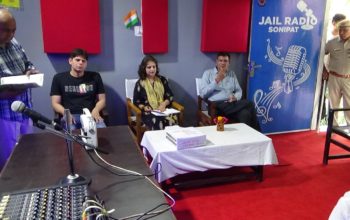Prison radio started at a usual time today, 7 am , but with unusual demands. More than 300 letters of requests were received today by inmates to listen to programmes, stories and songs of their choice. Interestingly, prison radio exceeded its time slot of 3 hours to 8 hours today, looking at the enthusiasm of inmates. They wanted to celebrate through the jail radio and wanted their family members too to listen to the few voices sitting at the other corner of the jail.
District Jail,Karnal in Haryana, which started its prison radio on 29 April, 2021, was a major hit today. With special announcements, songs and prayers, there were special repeat broadcasts of 15 songs related to Rakhi on the occasion of Raksha Bandhan. This came as a relief to all those inmates who spent their time in jail, especially during Covid-19. With strict restrictions on visitations during pandemic, inmates had to face a more difficult time during the festive season.
Background of District Jail, Karnal
Established in 1870, District Jail Karnal is a historical jail. Prison has a sanctioned capacity of 2434 inmates. Presently. The jail has an inmate population of 2166 inmates, including 2094 men and 72 women inmates. There are 649 convicts in the jail including 16 women. 3 children are also staying in the jail with their mothers.
About Karnal Jail Radio
Karnal Prison Radio daily airs programs for 3 hours . Ten inmates, including five women, have been trained as radio jockeys to run the daily programme. Dr. Vartika Nanda, Founder of Tinka Tinka Foundation, is the brain behind prison radios in the state of Haryana. Two inmates of this jail are part of Tinka Tinka Prison Research Cell which was established by Vartika Nanda in 2021.
Key players: District Jail Karnal
On this occasion, Vishal Chibber, jail superintendent, shared that inmates were really happy to hear songs devoted to brothers and sisters and demanded the songs be heard the whole day. According to Shelakshi Bharadwaj, Deputy Superintendent, District Jail Karnal, the two key radio jockeys- Sonia Choudhary and Amit Kumar were flooded with requests of songs and also special messages that inmates wanted them to announce through the jail radio microphone. Vartika Nanda said that jail radio is emerging as the main source of happiness in jails. Apart from fulfilling communication needs of inmates, it is becoming a source to fill the vacuum in their lives.
More than 2000 family members visited Karnal Jail today to meet their brothers/ sisters incarcerated in the jail, giving the day a happy ending.
About Tinka Tinka Foundation and Dr. Vartika Nanda
Tinka Tinka is the brainchild of prison reformer and media educator Dr. Vartika Nanda who heads the Department of Journalism at Lady Shri Ram College, University of Delhi. She has been honored with the Stree Shakti Award from the President of India in 2014. Her work on prisons has twice found a place in the Limca Book of Records. Her work on prisons was taken cognizance by the Supreme Court of India in 2018. Her recent research on the “Study of the condition of women inmates and their children in Indian Prisons and their communication needs with special reference to Uttar Pradesh” has been evaluated as ‘outstanding’ by ICSSR.
Read More on Amar Ujala: Inmates Get An Emotional On Rakhi, Time Of Karnal Jail Radio Had To Increase – Tinka Jail Radio: राखी पर भावुक हुए कैदी, फरमाइशी गानों की इतनी मांग कि बढ़ाना पड़ा करनाल जेल रेडियो का वक्त – Amar Ujala Hindi News Live




Tinka Tinka Prison Reforms by the President Awardee and India’s leading Prison Reformer Dr. Vartika Nanda is the purest form of reformation in India which is working incredibly good to improve the lives of the prisoners by clearing the presumption that people have about prisons and prisoners.
Tinka Tinka constantly works to improve the lives of the inmates and adding creativity in the jails. My curiosity about this amazing reform eventually took me to amazing books written by Vartika Nanda.
I recently read ‘Tinka Tinka Madhya Pradesh’ and that book has changed my perspective about prisons and has made me question the treatment given to the inmates in so many ways. The fact that children are also kept in prisons who grow up in a gloomy environment, losing their childhood and innocence is really heartbreaking. The comparison made by Dr. Vartika Nanda in this book between jails in today’s world and jails during freedom struggle was an eye opener for me. I am really inspired by this book and want to help these children and other inmates. That is a must read book.